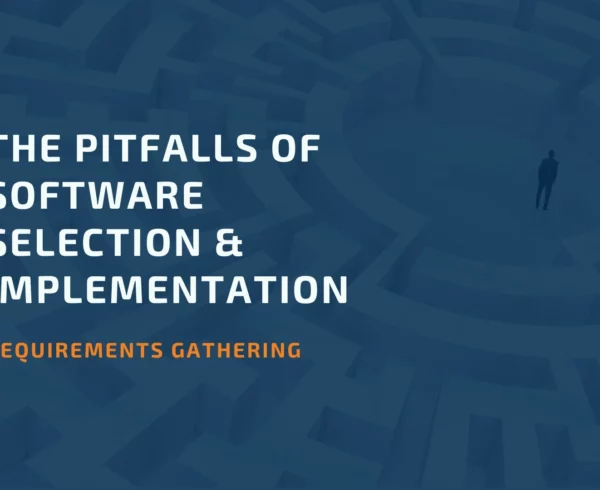Enterprise Resource Planning (ERP) software is one of the most complex and valuable software systems in an enterprise organization.
A successful ERP deployment enables organizations to streamline and automate their processes by combining a suite of integrated applications, thereby delivering a single source of truth across the business.
However, the ERP implementation process is fraught with potential pitfalls, including poor data migration and a lack of training for end-users. Therefore, successfully implementing ERP systems requires alignment, rigorous planning, and cross-functional collaboration. As a result, troubled implementations have often run way over budget, are behind schedule, or fail to deliver the business’s expected benefits.
Unfortunately, failed implementations are way too common, and if you have experienced or are experiencing a failed implementation, you understand the devastation it can cause for an organization. A project failure of this type can disrupt and demoralize individuals at every level.
Here is what you can do to salvage your “failing” ERP implementation or recover from “failed” ERP implementation:
Identify & Assess The Problem
The first step to fixing an unsuccessful ERP implementation is to assess why it has failed. Identify unrealistic expectations, fuzzy deadlines and directives, and resource requirements. Make a detailed list of these, labeling those you can fix immediately and those that need more time and examination.
Next, assign key employees to troubleshoot areas of concern and explore potential solutions. Especially, get feedback and opinions from employees in critical areas and departments via quick, short surveys or interviews. Make any gatherings positive, fact-finding exercises rather than gripe sessions. Thank all for their efforts, but be realistic while acknowledging the need for change. Resist pointing the finger at the software provider. After all, “failure” is often a combination of many factors colliding to cause an unintended, unwelcome consequence. Rather, agree that everyone should focus on pulling the company out of its difficulty by evaluating and improving its performance from here on out.

Re-Evaluate Your ERP Software Selection
In some instances, you will need to start over, and other times it’s better to fix what you’ve already started. You can discuss which option is better with your ERP partner for your company. Next, assess each area and department of the business that ERP is affecting. What are your key performance indicators? Where are your most significant operational pain points? Based on that, develop two tiers of potential solutions: stop-gap / “quick fix” solutions and long-term solutions. Next, determine the costs and time required to implement each option. Then, start implementing them. By doing so, these low-hanging fruit solutions will build organizational momentum and confidence. Once you get some “quick wins” with the shorter-term solutions, you need to prioritize and implement your long-term, more permanent fixes like you did with your short-term problems.

Revisit Your Change Management Plan
Many people fear change or are reluctant to move beyond their comfort zone. Ensuring that your staff is part of the decision-making process is critical. By voicing their desires and concerns along the way and being heard, they will be more willing to change.
Bear in mind that most ERP implementation projects will require some internal changes as to how things are being done in one system may not work in the new system. Be transparent with your staff by letting them know of the possible pitfalls while reassuring them that the new processes will serve their best interests due to their valuable input. Revisit your original change management plan and re-evaluate it based on what you’ve learned. If you don’t have a plan, develop one. Make changes to your plan and follow through. An ERP implementation failure is often a human failure rather than a software issue.
Customize Only When Needed
One of the biggest issues ERP consultants face is a client who refuses to change. In this instance, the partner needs to implement a lot of additional customizations to make the new system work the same way as the old system did. However, it is dangerous if proper testing of the customizations is not performed.
Remember, it’s best to change internal processes to work with the system’s design when possible. While some customization is often required and possible, over-customization can cause huge technical issues that throw everything out of gear. You should only perform customization to drive benefits for the company.

Test, Retest and Test Again
ERP implementation is complex, and failure rates are high. By rigorously testing your solution, you can help ensg ERP failure again. The QA or testing team will check each part of the new ERP system for bugs anure the quality of your application and identify areas for improvement. Outline and manage your test scenarios, articulate your expectations, and evaluate your results. By testing the solution’s critical processes and overall performance, you can increase your odds of avoiding data integrity, alongside running user testing to ensure that end users are satisfied with the software. User testing is a good way of beginning the training process to ensure the ERP system will be successful post-launch.
Before going live, there should be a check-in with users to understand their comfort level and if they are ready to go live. Some people will never be 100%, but that’s ok, and they need to have some confidence level that they are willing to use the system. It might be necessary to move the Go-live date if users aren’t ready from a training and testing perspective. Rushing to Go Live can cause more issues than delaying Go Live a week or month.
Conclusion
To see how we can help you turn around a failed ERP implementation, contact BHC Group for a free consultation. We will assess the damage and help you determine the next best step for your business.





